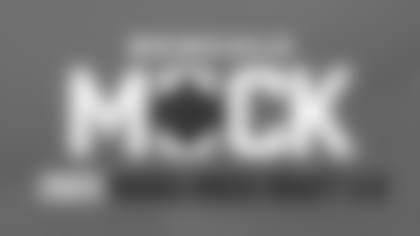A few days after Bengals head coach Zac Taylor flipped tight ends coach James Casey a game ball following the 24-18 win over the Bills Sunday night, Bengals.com senior writer Geoff Hobson sat down with Casey, the coach Taylor likes to call, "self-made." His players had combined for 10 catches, 101 yards, and two touchdowns and it turns out they were 25 yards shy of Casey's career-high during seven NFL seasons.
Casey played most of his 95 NFL games with the Texans, the opponent Sunday (1 p.m.-Cincinnati's Local 12) at Paycor Stadium. A teammate of Texans head coach DeMeco Ryans (they called him "Cap," even then), Casey was a fifth-round pick of Houston in 2009, six years after the White Sox drafted him in the seventh round out of his Dallas-area high school and Baseball America named his fastball the best in the 2003 White Sox draft class.
With his latest game ball, Casey preps for his old team and teammate, hoping to pull out a win like they did over the Bengals at Paycor back in the day.
The Conversation:
GH: When was the last time you got a game ball?
JC: It must have been as a player at some point. But not a lot, though. I almost had the he-be-gee-bees when he threw it to me.
GH: It looked like Zac threw you a grenade because you threw it to Irv (Smith Jr.) right away.
JC: It's the players. Those are the guys that are doing everything. I stand on the sidelines. I didn't do anything. Give it to those guys. They deserve it.
GH: You just went into the Rice Hall of Fame, so you must have got some game balls. Plus, playing 95 NFL games.
JC: In college I got a couple. That seven-day span was fun because Zac was gracious enough to let me go to Houston to get inducted into the Rice Hall of Fame. Then flew to San Francisco right afterwards, got a big win there, then come home on Sunday night and have the tight ends play as well as they did. The Hall of Fame was a memorable thing, obviously. It's not every day you get to go in the Hall of Fame as a player. And then go into a Sunday night game where the tight ends have all those catches and score touchdowns. Now we're setting the bar super high.
GH: Did you ever get a game ball with the Texans or in the NFL?
JC: I'm pretty sure I did. I got this shirt a couple of times. It said MVP and had a picture of a jackass on it. I won that award most of the time. For being the biggest jackass during the game. Cut blocking and stuff. That was the best award to get. I probably had (a game ball) when we played in New Orleans when I was with Houston. I had over 100 yards (126 on Sept. 25, 2011), I probably got a game ball then.
Other than that, like what Zac does sometimes, everybody gets a game ball. I've got a bunch of those. I still have them in the house. My wife put them in this big tube thing.
GH: Where is this one going?
JC: This one is going on the top. This one is way more special because it is the players that are out there making plays. It's about our group.
GH: You're a guy who loves to be known as just a grinder doing his job. You must be miserable with all this attention.
JC: I am. Hopefully, you'll be the last one. I don't mind because I love talking about the tight ends. I'm just excited for the tight ends to get some attention, get some love. They do a lot of the dirty work that doesn't get recognized most often with the blocking stuff and the pass protection and a lot of times in our routes.
You have certain routes where you're doing your best to get open and you're kind of in the progression. And then some routes you're not really in the progression much and you're like a checkdown for the quarterback or you're trying to do a job. Dig out the safety or run the corner off. They always do that stuff, being unselfish about it, and it's great to see them get some opportunities this last game.
GH: We're sitting here in your office with Tanner Hudson while he's watching film on the players' day off and your game plan day. That's not uncommon, right?
JC: It's awesome. Don't mind at all. Sometimes I tell him I have to do some things, but most of the time I'm watching film anyway and he's just watching it with me. It is so much better in my mind watching it in here with a clicker instead of on an iPad. You can pause it real easy. Fast forward. I tell the guys, too, it's great when somebody else is running the clicker. When I'm doing it and they're watching, just the simple fact of not having to press that button, it makes it where you can see more. I may see something different than if was doing the clicker.
GH; When you were at Rice, you played everywhere, right?
JC: I just got really fortunate to be in a situation where I got opportunities, but I felt like I earned it. And I was willing to do anything. Kind of like the tight ends we've got here. They do so many different things. But I was just willing to do everything and I would even go to the coach sometimes and, 'Hey, can I return punts?' Or, 'I think I'll be better holding on field goals.' I held on field goals. I was a punt returner. Played tight end, receiver, quarterback.
GH: You threw a pass at Rice, right?
JC: A few (12). I did a bunch of quarterback Wildcat stuff. If I had stayed at Rice, I would have played quarterback the next couple of years. But I was older and I didn't think I could get much better than I did my true sophomore year.
GH: You were a triple major?
JC: Economics, managerial studies, sports management and I minored in business.
GH: You must have done well in high school. Azle High School, not far from Dallas.
JC: I was ranked 11th in my class of about three hundred and something. To me, it was just common sense, even as a kid. I know I have to go to school until I graduate. Why not be the best in school? At least try. It's going to benefit me in all kinds of ways. Obviously. I love sports, so why would I not want to be the best at it? Why be average? I'm definitely not meant to be just average. For some reason, that's not how some people are. They're not just concerned with being the best. That's why I love the NFL. We don't tolerate anything but the best. We're here to be dominant. If you're not, you don't play in the NFL.
GH: So you came out for the 2009 NFL Draft at age 24 because you went to the minors right out of Azle High School in Texas. What made you drop baseball and go to college football at age 22?
JC: I just sucked at baseball. I got fired. Nobody hired me. I said I've got to do something else. And I knew I was good in high school. And I saw some guys that I played football with in high school and they were playing college at smaller schools. I said I think I can be better than those guys. And just watching TV while I was playing minor-league baseball.
GH: You were a high school quarterback, right?
JC: We ran the triple option. Not a lot of college coaches are looking for triple-option guys.
I was just talking to Tanner about recruiting. It's not an exact science. Looking back on it now I'm like, how did I not get attention from college teams? I was like 6-3, in great shape. I was good in baseball, so I got people to look at me in baseball but I would love to have played football in college, but no one gave me an opportunity.
GH: So you went into college football cold.
JC: I ended up having two knee surgeries my senior year in high school, so I missed most of that season. Then I played minor-league baseball for four years. I was just a rookie. I was not very good. But I was a seventh-round pick, so I had talent. I could throw the heck out of the ball. I just never could get down throwing strikes. I never had any training as a kid. I've got two boys now and I'm trying to get them to have that training so if they have the kind of arm I had they can take advantage of it.
I touched 96 in high school. Threw low 90s and that's with no training. Then I went to play college football and I had to recruit myself. I sent my information to every single college. Rice ended up giving me an opportunity, but I hadn't played in four or five years.
GH: That's an old freshman.
JC: I was an old college freshman. I was already married, too. Day one I was the oldest guy on the team and the only married guy on the team.
It was all about football in school. I didn't do anything besides that. I was just kind of maniacally focused on being good, and what helped me most in baseball is getting fired like I did. You look back on it and you're like, I could have worked a little harder. I could have not cared too much about what everyone else was doing. I was worried about things that didn't matter. And I took that to heart when I was done playing, I said that's never going to happen to me again.
I'm not being disrespectful, but I'm not taking a lot of crap from people. I'm not worried about what anybody else is doing because it's wasting my time. I'm rooting for everybody because there's more than enough to go around. I kind of caught myself when I was playing baseball. I was like, man if he doesn't look good, maybe it makes me look better. Which is the dumbest mindset to have.
GH: You went to Rice willing to do anything.
JC: I came in there day one, nobody's going to outwork me in the entire country. I held (for kicks).
I was the backup punter and backup deep snapper. Played wide receiver, quarterback, tight end.
GH: And after only two years the pros called?
JC: I was thinking about it after my freshman year, but I didn't get enough opportunities until later in the year.
GH: So you taught yourself football?
JC: I had great coaches in college. David Baliff was the head coach. Tom Herman was offensive coordinator. He was a young guy, but he went on to be the head coach at Texas and he was the offensive coordinator at
Ohio State when they won the national championship.
He gave me my first job in coaching at Houston.
He was a real smart guy and understood football. And I was in the quarterback room the entire time in college. I'd be in the quarterback meeting rooms and I was the backup quarterback and I would do all the quarterback drills and then when we got to practice I would just go to receiver. So I never did any receiving drills or anything like that. I was always just doing quarterback stuff and knew all the routes. and then just go play receiver when we started playing football. They knew I was smart enough not to need a bunch of drills all day long and I
was getting so many opportunities, it's like they wanted me to take something off my legs.
GH: How much tight end did you play?
JC: A little bit. We were a spread offense. We really didn't attach much, but when we did do that I was the tight end. I played all over the place. I played all the skill positions. We had all these different personnel packages and sometimes I'd be receiver, sometimes I'd be the running back. Sometimes I'd be the quarterback. We had a real creative coach that moved us around a whole bunch.
GH: So the Texans drafted you in the fifth round as a tight end even though you barely played it?
JC: What I'm most proud about is I played seven years in the NFL even though I didn't block in college. I didn't even play tight end. I had to learn how to get in a three-point stance. It's really helped me as a coach. I don't take anything for granted as far as the tight ends knowing certain things because I had to learn all this stuff myself. Three-point stance and all the different things that go into blocking technique and leverage and how to get the feel of what it feels like.
So I had to learn all that stuff, but by the end of my career I was considered a blocker after coming out of college as a pass catcher. That's probably what I'm most proud of is that transition.
I realized after the first year, they're not going to throw me the ball really at all. We've got all these guys like Andre Johnson and these guys they're throwing the ball to. (Tight end) Owen Daniels was there. I better be a great blocker, great special teams player because it's all about playing as long as I possibly can in the NFL. Yeah, I want opportunities, but I've got to make sure I'm staying in the league to keep doing what I love to do and keep making money for my family. I ended up being a fullback. I would just lead block all the time.
GH: In a very good running game. Running back Arian Foster had some big years. He killed the Bengals in two playoff games.
JC: Any time we get a fullback back there, I get excited because that's personal to me. We sprinkle in a little bit of that stuff … You have to be able to do everything in the NFL. You have to keep them off balance.
*GH: You played here a few times. The Kevin Walter Game. Former Bengals wide receiver Kevin Walter came in here playing for the Texans (Dec. 11, 2011) and beat the Bengals on the last play of the game with a catch, 20-19. What do you remember about that? *
JC: I remember first time in franchise history that the Texans go to the playoffs. We needed to win and we needed somebody else to lose. And so we're playing here and we've got T.J. Yates out there playing quarterback and I just remember the last drive him hitting the tight end a few times and scrambling.
GH: Did he hit you?
JC: Not in that drive. I remember the play for sure. It was the end zone towards the river. We kind of have a similar concept of this. Every team does. In the red zone. three detached and the outside guy runs an out route, the number two guy runs either like a pick flat or like a stick route and the No. 3 guy runs the same thing. And your idea is you're trying to get the inside guys on a double move and if they carry it, then you can throw the out route. Especially a one-step slant to the outside guy. And we call that play and Yates held on to it and held on to it and he found Walter to win the game on the last play.
And then when we were in the locker room here, which I don't think I've been back to the visiting locker room. I don't remember what it looks like. I remember sitting in there watching the TV and the Titans or somebody lost and we ended up clinching (the AFC South title) and got the hats and everything here.
GH: You guys played Cincy in the playoffs that year and the next year and you were in Denver in 2015 when they played the Broncos in a late-season game to get to the playoffs.
JC: By then I was fired. I only played a few games that year. My knees were kind of jacked. I knew the writing was kind of on the wall.
GH: How did you get into coaching?
JC: I just thought it thoroughly through while I was playing. I thought about everything that I could possibly do. I thought about investment banking or law school. Basically, I was just thinking about how I can make a lot of money. Politics, whatever. I thought, I love football. I'm studying all this stuff.
I just love the gamesmanship behind it, the scheme stuff. If you're smart and you really understand it, it can be an advantage. And I wanted to make an impact. To younger people. I still get to talk to kids. Go to high schools and talk to kids. My own players.
GH: You started coaching right after you retired.
JC: At Houston. I went to eight different teams first, but nobody signed me because the X-Rays on my knee didn't look good. While I was playing I went and visited Tom Herman for a week at Ohio State for a week, visited (Kliff) Kingsbury for a week at Texas Tech. I was basically letting everyone know when I'm done playing, I want to coach. If you think I'm worthy of an opportunity, please consider me.
GH: Zac told the story this week that his brother Press told him to hire you. Just hire you. And there was no interview. He called you twice and each time you just said yes.
JC: Whatever he said, that's what is true. Yeah, that's true.
GH: Did you know Zac?
JC: I knew his brother from being in Philadelphia and once he called me the first time I started looking him up and I saw how he was with the Rams and they were doing great. I know how hard it is to get in the NFL. I didn't know what team he would go to. I didn't care. I just wanted an opportunity. It ended up working out awesome here. It's crazy now here in year five. Just thinking about then and now. That's why I
never want to be entitled. Always assume your job is on the line every day. That's how the players' lives are. I remember being a player. Every single day, you could get fired.
GH: You have been.
JC: I've been fired multiple times. I'm not looking for any other jobs. I'm not talking to a whole bunch of people. I'm just focused on this job. That's the best way. You try to just grow and get better and better, just like I did as a player, and luckily I did enough good things as a player his brother said good things about me. And some of the other coaches that he knew that were on the Eagles when I played there.
Basically, that's all it was. I was not afraid to tell people what I wanted to do. I knew what I wanted to do. As a player, I was all about my business. No drama. I'm just about football, trying to learn, play hard all the time. Be a tough guy and try to help players around me as much as I could.
GH: Is the fact you don't like attention because of the position you played and coach, or because of the kind of guy you are?
JC: Probably both. I
just try to think big picture about things and keep things in perspective that I'm the tight ends coach. Nobody wants to hear from the tight ends coach.
GH: Who is the most famous guy you pitched to in baseball?
JC: It may have been Jose Cruz Jr. I can't think of their names now. It was so long ago. Most of the time
it was the big leaguers when they came down to the minor leagues to do rehab stuff. I would face some guys. And I probably was not even aware. I was 18 years old. I wasn't even aware who would go on and play in the big leagues. You don't do advanced scouting reports in the minor leagues. You just go out there and play. You might not recognize those names at the time , but some of these guys end up being in the majors.
GH: Do you keep in touch with any of your teammates?
JC: Just a couple. Gio Gonzalez played in the big leagues for a while. Boone Logan was a pitcher who was with the Yankees for a while. Multiple guys who ended up playing in the big leagues.
GH: Best pitch was the fast ball?
JC: Fastball. I had a really good curve ball. Gio was electric as a pitcher. I learned so many things doing that. What not to do. I was a professional athlete but I had no training, nothing. Had hardly been out of the city before. All the things I learned doing that are going to stick with me.
GH: What does it mean to play against the Houston Texans when you're coaching against them? Does that matter? Is it a little extra special?
JC: It matters a little bit just because you've got memories of that place. You remember being in those buildings. Going to practice and playing games. You remember playing games here. You just kind of remember being part of that organization. I think the long snapper, Jon Weeks, is the only guy still on the roster from when I played. He's had a heck of a career.
I played with DeMeco for
three or four years. And then I played with DeMeco in Philadelphia for a couple of years.
GH: What's he like?
JC: Awesome guy. Genuine nice guy. Real down to earth. I don't know him as a coach, but when he was a player we called him, 'Cap,' Nobody called him DeMeco. They just called him , 'Cap.' He was basically the captain. Leader. In the right way. Not look at me, look at me. He wasn't just saying stuff all the time just to say it. When he was saying things, people were listening. Once I saw he was in coaching, I was like, for sure he's going to be a head coach pretty soon. He's that type of guy.
GH: They're talking about him as a coach of the year candidate.
JC: Watching the film, they dang sure play hard on defense. I mainly watch the
defensive ends and they've got that rookie Will Anderson, He's a good player. He'll be a real good player. Jerry Hughes is still going strong.
GH: Back to the clicker, I guess.
JC: Thanks for coming in and talking about the tight ends.







